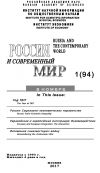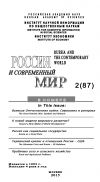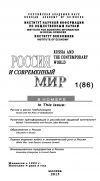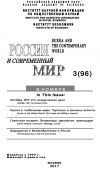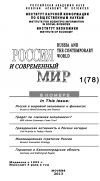Текст книги "Россия и современный мир №4 / 2017"
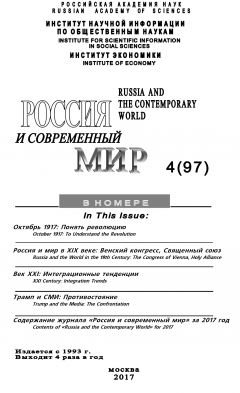
Автор книги: Юрий Игрицкий
Жанр: Журналы, Периодические издания
сообщить о неприемлемом содержимом
Текущая страница: 9 (всего у книги 22 страниц)
Версальский мирный договор 1919 г. отменил таможенную унию Люксембурга с Германией. В вопросе политического будущего Люксембурга французская дипломатия настаивала на том, что судьбу герцогства должен решить национальный референдум. В 1918 г. активизировалась французская пропаганда в Люксембурге. Негласно Франция начала кампанию за установление в Люксембурге республиканского режима. В 1919 г. в стране прошел референдум, на котором большинство населения высказались за заключение экономического союза с Францией, от которого, однако, Франция отказалась, сосредоточив свое внимание на заключении военного соглашения с Бельгией. В мае 1920 г. французский посланник в Люксембурге от имени своего правительства посоветовал руководству герцогства создать экономический союз с Бельгией [14, p. 230].
Соглашение о создании бельгийско-люксембургского экономического союза (БЛЭС) было подписано 25 июля 1921 г. и вступило в силу 5 марта 1922 г. Это соглашение имело экономическую основу, однако именно оно заложило основу участия Люксембурга в европейской интеграции во второй половине ХХ в. Своеобразным возвратом к решениям Венского конгресса в 1940-е годы стало образование на той же территориальной основе, на которой в 1815 г. было создано Королевство Объединенных Нидерландов, экономического объединения Бенилюкс3535
В 2010 г. вступило в силу новое соглашение о Бенилюксе, продлившее действие этой организации до середины XXI в.
[Закрыть].
Созданное в 1815 г. Великое герцогство Люксембург, безусловно, явилось продуктом Венской системы, но ему пришлось много испытать для обретения полноценной государственности. Постепенно шел процесс и формирования нации в Люксембурге. В результате в ХХ в. это малое государство политически и экономически полностью вписалось в европейскую систему, став равноправным членом единой Европы. Сегодня Великое Герцогство, опережая по экономическим показателям крупные государства, является важным партнером не только государств – членов ЕС, но и России.
Библиография
1. Архив внешней политики Российской империи.
2. Зак Л.А. Монархи против народов. М.: Международные отношения, 1966. 382 c.
3. Мартенс, Ф. Собрание трактатов и конвенций, заключенных Россией с иностранными державами. СПб.: Тип. М-ва путей сообщения (А. Бенке), 1875. Т. 2. Трактаты с Австрией. 1772–1808. 517 с.
4. Мартенс, Ф. Собрание трактатов и конвенций, заключенных Россией с иностранными державами. СПб.: Тип. М-ва путей сообщения (А. Бенке), 1895. Т. 11. Трактаты с Англией. 1801–1831. 492 с.
5. Мартенс, Ф. Собрание трактатов и конвенций, заключенных Россией с иностранными державами. СПб.: Тип. М-ва путей сообщения (А. Бенке), 1892. Т. 12. Трактаты с Англией. 1832–1895. 504 с.
6. Намазова А.С. Бельгийская революция. М.: Наука, 1979. 199 с.
7. Русская дипломатия и нейтралитет Люксембурга в XIX веке // Новая и новейшая история. 1973. № 2. С. 138–148.
8. Шнеерсон Л.М. Франко-германский конфликт из-за Люксембурга в 1867 г. Минск: Изд-во БГУ им. В.И. Ленина, 1969. 120 с.
9. Angeberg, comte d'. Le Congrès de Vienne et les traités de 1815. Précédé et suivi des actes diplomatiques qui s'y rattachent. Paris: Amyot, 1864. Vol. 2. 866 p.
10. Calmes A. Naissance et débuts du Grand-Duché 1814–1830. Luxembourg: Saint Paul, 1971. 570 p.
11. Dollot R. Les origines de la neutralité de la Begique et le système de la barrière (1609–1830). Paris: F. Alcan, 1902. 616 p.
12. Pirenne H. Histoire de Belgique. T. I–VII. Bruxelles: Maurice Lamartine, 1948. T. VI. 467 p.
13. Ruppert P. Le Grand-Duché dans les relations internationales. Recueil des traités, conventions et arrangements internationaux. Luxembourg: Cour V. Bück, 886 p.
14. Stengers J. L’accord militaire franco-belge de 1920 et le Luxembourg // Les relations franco-luxembourgeoises de Louis XIV à Robert Schouman. Metz, 1978. P. 227–243.
15. Trausch J. Le Luxembourg entre la Belgique et la Hollande 1830–1839. Aux origines du sentiment national luxembourgeois // Actes du Colloque historique sur les relations belgo-néerlandaises entre 1815 et 1945. Bruxelles, 1982. P. 247–276.
16. Trausch G. Les Luxembourgeois devant la Révolution française // Les relations franco-luxembourgeoises de Louis XIV à Robert Schouman. Actes du Colloque de Luxembourg / Sous la dir. de R. Poidevin et G. Trausch. Metz, 1978. P. 84–117.
17. Trausch G. Les relations fraco-belges à propos de la question luxembourgeoise (1914–1922) // Les relations franco-belges de 1830 à 1934. Metz, 1975. P. 275–293.
18. Vanlangenhove F. L'élaboration de la politique étrangère de la Belgique entre les deux guerres mondiales. Bruxelles: Imprimerie J. Duculot, 1979. 404 p.
19. Zamoyski A. Rites of Peace. The Fall of Napoleon and the Congress of Vienna. London: Harper Press, 2007. 656 p.
References
Angeberg, comte d'. Le Congrès de Vienne et les traités de 1815. Précédé et suivi des actes diplomatiques qui s'y rattachent. Paris: Amyot, 1864. Vol. 2. 866 p.
Arhiv vneshnej politiki Rossijskoj imperii.
Calmes A. Naissance et débuts du Grand-Duché 1814–1830. Luxembourg: Saint Paul, 1971. 570 p.
Dollot R. Les origines de la neutralité de la Begique et le système de la barrière (1609–1830). Paris: F. Alcan, 1902. 616 p.
Martens, F. Sobranie traktatov i konvencij, zakljuchennyh Rossiej s inostrannymi derzhavami. Saint Petersburg: Tip. M-va putej soobshhenija (A. Benke), 1875. Vol. 2. Traktaty s Avstriej. 1772–1808. 517 p.
Martens, F. Sobranie traktatov i konvencij, zakljuchennyh Rossiej s inostrannymi derzhavami. Saint Petersburg: Tip. M-va putej soobshhenija (A. Benke), 1895. Vol. 11. Traktaty s Angliej. 1801–1831. 492 p.
Martens, F. Sobranie traktatov i konvencij, zakljuchennyh Rossiej s inostrannymi derzhavami. Saint Petersburg: Tip. M-va putej soobshhenija (A. Benke), 1892. Vol. 12. Traktaty s Angliej. 1832–1895. 504 p.
Namazova A.S. Bel'gijskaja revoljucija. M.: Nauka, 1979. 199 s.
Pirenne H. Histoire de Belgique. T. I–VII. Bruxelles: Maurice Lamartine, 1948. T. VI. 467 p.
Ruppert P. Le Grand-Duché dans les relations internationales. Recueil des traités, conventions et arrangements internationaux. Luxembourg: Cour V. Bück, 886 p.
Russkaja diplomatija i nejtralitet Ljuksemburga v XIX veke // Novaja i novejshaja istorija. 1973. N 2. S. 138–148.
Shneerson L.M. Franko-germanskij konflikt iz-za Ljuksemburga v 1867 g. Minsk: Izd-vo BGU im. V.I. Lenina, 1969. 120 p.
Stengers J. L’accord militaire franco-belge de 1920 et le Luxembourg // Les relations franco-luxembourgeoises de Louis XIV à Robert Schouman. Metz, 1978. P. 227–243.
Trausch G. Les Luxembourgeois devant la Révolution française // Les relations franco-luxembourgeoises de Louis XIV à Robert Schouman. Actes du Colloque de Luxembourg / Sous la dir. de R. Poidevin et G. Trausch. Metz, 1978. P. 84–117.
Trausch G. Les relations fraco-belges à propos de la question luxembourgeoise (1914–1922) // Les relations franco-belges de 1830 à 1934. Metz, 1975. P. 275–293.
Trausch J. Le Luxembourg entre la Belgique et la Hollande 1830–1839. Aux origines du sentiment national luxembourgeois // Actes du Colloque historique sur les relations belgo-néerlandaises entre 1815 et 1945. Bruxelles, 1982. P. 247–276.
Vanlangenhove F. L'élaboration de la politique étrangère de la Belgique entre les deux guerres mondiales. Bruxelles: Imprimerie J. Duculot, 1979. 404 p.
Zak L.A. Monarhi protiv narodov. Moscow: Mezhdunarodnye otnoshenija, 1966. 382 p.
Zamoyski A. Rites of Peace. The Fall of Napoleon and the Congress of Vienna. London: Harper Press, 2007. 656 p.
The Congress of Vienna and the Atlantic Slave Trade
A. Forrest
Abstract. The article studies the consequences of the slave trade prohibition by Britain in 1807 and the influence of this Act on the elaboration of the joint declaration condemning the slave trade during the Congress of Vienna and its role in the Anglo-French relations from 1807 to 1830-s. The other key issues are obstacles of the slave trade ban enforcement, regional economic changes, and the Atlantic politics of the main maritime states.
Keywords: slavery, abolitionism, slave trade, triangular trade, commercial diplomacy, Caribbean, maritime states, West Africa, maritime traffic.
Forrest Alan – Professor of the University of York. E-mail: [email protected]
А. Форрест. Венский конгресс и трансатлантическая работорговля
Аннотация. В статье рассматриваются последствия запрета работорговли Великобританией в 1807 г. Оценивается влияние данного закона на выработку совместной декларации на Венском конгрессе, а также на англо-французские взаимоотношения до 1830-х годов. Отдельное внимание уделяется трудностям реализации запрета, региональным экономическим изменениям и атлантической политике ведущих морских держав.
Ключевые слова: рабство, аболиционизм, работорговля, треугольная торговля, торговая дипломатия, Карибы, морские державы, Западная Африка, морское сообщение.
Форрест Алан – профессор Университета Йорка. E-mail: [email protected]
The Congress of Vienna was seized upon by British abolitionists as an unrivalled opportunity to advance their cause in Europe. Since 1807, when Britain had abolished its own Atlantic slave trade, reformers had pressed hard to end slaving entirely; for many, like Thomas Clarkson and William Wilberforce, theirs was the supreme moral cause of the age and one which it was Britain’s duty to press on other European leaders. Abolition was seen as a potent symbol of Britain’s protestant morality, and abolitionists clamoured for action, unwilling to be «answerable for the guilt» of doing nothing [18, p. 125]. At the Congress of Vienna British ministers did try, though without great success, to impose their moral view of the world on all the signatory nations, driven by abolitionist demands in parliament and by public opinion at home [20, p. 46]. In particular, the British were eager to impose the cause of abolition on France, traditionally their most bitter rival in the North Atlantic, and now that they had, as they saw it, taken a full part in Napoleon’s defeat, they were reluctant to allow the French to profit from a trade which Britain had voluntarily disavowed. For Wilberforce, Clarkson and other leading abolitionists the issue became the touchstone by which the Foreign Secretary, Lord Castlereagh, and the entire ministry would be judged. Would they impose Christian values on the French, or would they risk being seen in Britain as having been outmanoeuvred by Louis XVIII and Talleyrand? It was a public relations issue at home before it was a diplomatic issue abroad.
For the abolitionists there was little room for compromise. In April 1815, at the moment of Napoleon‘s abdication, they were already planning for total abolition across Europe. In a private letter Wilberforce wrote that he was «extremely occupied, both mind and thoughts, with considering about, and taking measures for effecting a convention among the great powers for the abolition of the slave trade» [12, p. 356]. Samuel Whitbread, speaking to the Commons on April 28, expressed the hope that «in the pending congress a decisive declaration would be made by all the allies against the continuance of this nefarious traffic; and that this declaration would be followed up by efficient acts on the part of each of those allies; at least, that the utmost influence of this country would be used to promote this desirable and desired end» [14, p. 576, House of Commons, 28 April 1814]. Wilberforce went further, arguing before the House on 2 May that «there never was a period when the general circumstances of all nations were more favourable to such a motion than the present, and when there existed such powerful motives for them to accede to its object». It was surely, he continued, an unrivalled opportunity «when all the great powers of Europe were assembled in congress to consider and discuss the very elements, as it were, of their own political rights». He then, not uncharacteristically, got carried away by the religious import of the moment, concluding that, when he examined the «extraordinary succession of providential events which had placed the world in its present state of hope and security, he could not but contemplate in them the hand of the Almighty stretched out for the deliverance of mankind» [14, p. 637; 2 May 1814].
Wilberforce’s view found many echoes in the churches and meeting houses of Methodist, Baptist and Quaker Britain where some of the most committed abolitionists congregated. Many believed – in the words of Dissenters in Derby – that it was a specifically Christian cause, and that slavery was «a system full of wickedness, hateful to God, and a curse and disgrace to Britain» [19, p. 31; 32, p. 155–156]. They convinced themselves that with the defeat of Napoleon it was now only a matter of time before the Atlantic slave trade would be abolished. But if they thought it would happen overnight, they were to be disappointed. Abolition would be the subject of extended diplomatic negotiation, first at Paris, then at Vienna, and during Castlereagh’s ministry between 1815 and 1822 [25, p. 192].
The abolition lobby at Westminster – «the Saints» in the slightly sarcastic language of their contemporaries – made no attempt to hide its ambition to force through abolitionist measures in France and the other slaving nations of Continental Europe, whether or not their rulers acquiesced. They believed that the colonies which Britain had captured during the war, from France and Spain in particular, would now provide London with excellent bargaining counters in the negotiations to follow. Britain, it was implied, had won its war with France, on land in the Peninsula as well as at sea and in the colonies, and it followed that the peace should be Britain’s, too. They urged the government to press home its diplomatic advantage, first recruiting those countries which had no direct interest in the slave trade (Russia, Prussia and Austria), then putting pressure on the Dutch to heed «the wishes of the British nation», before trying to wrest concessions from Spain and France. Some wanted to link the return of captured colonies to commitments to abolish slaving. Others were intent on stopping France, Spain and Portugal from trading in slaves with immediate effect. Clarkson, believing that Louis XVIII was broadly sympathetic, suggested that the cession of an additional West Indian island to France could be the price of immediate French abolition. Talleyrand, who resisted any such immediate legislation for France, remarked that for the English the slave question had become «a passion carried to fanaticism and one which the ministry is no longer at liberty to check» [26, p. 132–135]. This perception was widely shared, and it could be a handicap for British diplomacy when it sought to press the abolitionist cause. Castlereagh remarked to Lord Liverpool in October 1814 that the extent of domestic pressure that was being exerted on this single issue restricted his diplomatic flexibility, and he complained of «the display of popular impatience which has been excited and is kept up in England upon this subject» [1, p. 388].
Interestingly, only seven years after Britain’s own abolition the Atlantic slave trade, few voices were raised to challenge the wisdom of abolition. In 1806–1807, of course, in the run-up to abolition, there had been protests and petitions, notably from the Atlantic slaving ports and the great industrial cities; but they were always, as in the case of Liverpool or Manchester, couched in economic terms. And for that reason, argues Seymour Drescher, they had been unable to muster much popular support. «Because it hung on the single thread of capital alone», he argues, «the allegiance to the slave trade virtually died with abolition» [10, p. 189]. In contrast, the abolitionists were formidably well organised, ready at any moment to stir up the public’s sense of moral outrage. In 1806, for instance, among the cotton interests in Manchester there were many who, not unreasonably, were anxious for the future of their trade and their city’s prosperity. When a petition circulated by the anti-abolitionists in Manchester obtained over 400 signatories, many protesting that their livelihood would be threatened if abolition were to pass into law, Clarkson leapt into action, circulating an abolitionist petition in the city that overnight gained 2300 signatories. The names were collected swiftly, since the petition had to reach the Lords in time for the second reading of the bill; with an extra day’s campaigning, the abolitionists were confident that they could have secured twice that number. With the wider public, it seemed, trade could always be trumped by non-conformist zeal [4, p. 142–144].
The slave traders themselves were not so easy to win over. In the years between Britain’s Act of Abolition in 1807 and the end of the Napoleonic wars in 1814, British slaving had not been completely suppressed: Zachary Macaulay, the secretary of the African Institution, listed 36 suspected slave ships leaving Liverpool alone in 1809 [31, p. 298]. But over time Britain’s slaving ports had been able to diversify and to take full advantage of the new commercial opportunities that her overseas empire provided. By 1814, when the abolitionists were able to claim a high level of support in Liverpool, commercial interests had not been entirely silenced, but, with a few exceptions, they were no longer directed towards the restoration of the slave trade. Rather they feared a resurgence of French trade on the back of slaving which would be to Britain’s lasting disadvantage. At a Liverpool petition meeting at which John Gladstone put the merchants’ case, he sought to end the slaving activities of Britain’s rivals. «Not only would France benefit by the lack of competition in Africa», he argued, «but it would thereby win the European market for tropical staples, restoring the pre-war British inferiority on the Continent» [10, p. 190]. The solution was to stop French slaving rather than restore the trade in England. But overall what is most notable is that trading concerns played such a minor part in what was, even in Liverpool, overwhelmingly perceived as a moral debate.
In France, the debate between abolitionists and anti-abolitionists was more evenly-balanced. Nor was the cause of anti-slavery widely linked to religion in a country where the voices raised against slavery more commonly resorted to the language of enlightenment in the manner of Montesquieu or the Abbé Grégoire [20, p. 96]. For many the slave trade appeared an economic necessity if the country was ever to recover its former prosperity or to be able to compete commercially with Britain. Abolitionism spelt decline and decay, especially in the port cities of the Atlantic. Some apologists went further, arguing that there was nothing immoral about agricultural slavery, that Britain was acting not out of moral outrage but in order to impose her commercial dominance, even that Britain’s sole interest in abolishing the trade was as a means of finding extra manpower to fight her American wars. Nationalist outrage played too: there was understandable opposition to Britain’s claims to board French commercial ships at will. As for the Bourbon monarchy, while Louis XVIII might seek to appease Britain in the diplomatic context of 1814 and was prepared to make general, if unspecified, commitments to the future abolition of the slave trade, he had no interest in standing in the way of France’s economic recovery or in antagonising his Iberian neighbours. There was also widespread resentment of what was seen as British bullying on the question, its attempts to introduce in peacetime a practice that had only been sanctioned in international law in war [9, p. 345]. Besides, anti-slavery as a moral cause did not arouse the same level of indignation in Catholic France as in Protestant England. Perhaps it was because the great Catholic nations of Iberia were so deeply involved in the slave trade; perhaps because the Pope did not get round to condemning slavery until 1839. In any case the movement for religious anti-slavery developed only slowly, largely through the work of the Société de la morale chrétienne in the 1820s3636
[23]. The Society was one of the few specifically Christian organisations in France to play an active role in the campaign against the illegal slave trade after 1820.
[Закрыть]. Only then do we see a flurry of works condemning the slave trade, while influential English publications, like Thomas Clarkson’s Le cri des Africains, became available in French translation [4].
Clarkson enjoyed an unusual level of popularity and exposure in France, and not just because he was a well-known English abolitionist. He had, amongst the English anti-slavery campaigners, a unique knowledge of the French Antilles, and had championed the cause of those black insurgents in Haiti who had thrown off their colonial shackles and had ended the bondage of their fellow citizens. He also, between 1816 and 1820, would sustain a regular correspondence with the Haitian king, Henry Christophe, offering his advice on diplomatic and political matters. That correspondence, which was maintained until the King’s death, had begun when Christophe contacted Clarkson seeking his advice. The English abolitionist had already an established reputation, and his anti-slavery society – the African Institution – had followers throughout the Caribbean. As Clarkson recounts the receipt of Christophe’s first letter, it was a moment to savour: «The King wrote me a letter in which he was pleased to say that “he had heard of my exertions to abolish the Slave Trade, for which he, in common with those of his race, could not feel too thankful; that he had a just abhorrence of it; and would do all he could do suppress it, either by subscription to the society [the African Institution] in London, or by anything he could do at home; that he should forever love the English nation for their generosity towards Africa; and that he would endeavour, by degrees, to introduce their laws and constitution into Haiti”»3737
Clarkson’s unpublished Autobiography, quoted in: [18, p. 63].
[Закрыть].
Clarkson, Wilberforce and other English abolitionists were gradually able to influence French public opinion, too, arguably to more effect than the diplomatic manoeuvrings of the British government at Vienna.
France was, of course, only one of the major European players in the Black Atlantic. Spain and Portugal continued to operate fleets of slaving vessels between Africa and South America. Nor should we forget that this debate was only about European involvement in the Atlantic slave trade. It did not concern the institution of slavery in the colonies of the Latin America and the Caribbean, where all European powers, Britain included, continued to operate slave economies until at least the 1830s. Nor did it affect the slave states of the United States, where slavery remained in force until the Civil War in 1861. In the Caribbean, Cuba would prove a valued place of refuge for planters and their slaves fleeing the violence in Saint-Domingue3838
For a discussion of the impact of events in Haiti on the plantation economy of Cuba, see: [35].
[Закрыть]. Not even Britain thought of abolishing the institution of slavery in 1815: Africans remained enslaved in Britain’s American colonies until the mid-1830s. As a consequence, slavery and abolition would remain at the heart of Atlantic politics not only during the Restoration but across much of the nineteenth century. Little could be achieved immediately.
Britain’s campaign to force abolition on France was already stagnating at a moment when Europe’s diplomatic efforts – and, indeed, Britain’s own priorities – were concentrated on other, more pressing issues. After a quarter of a century at war, the continent needed to establish the basis for a lasting peace. Carving up Napoleon’s annexed territories in Europe, building buffers between the great powers and organising dynastic settlements occupied centre stage, and Castlereagh’s moral concerns over slavery were quickly relegated to the periphery. The Treaty of Paris in May 1814 proved a disappointment for the abolitionists, as it addressed only the future of the French slave trade, excluding mention of any of the other slaving powers. And it did not give them the clear victory they sought. Under the terms of the Treaty, France was given back her Caribbean colonies but was not forced to agree to an immediate suspension of slaving. Instead, she was to be allowed a five-year period of grace during which to run down the slave trade and realign her commerce, five years in which slaves from West Africa would continue to repopulate the plantations in the West Indies and restore a flourishing slave economy to the islands [3, p. 195].
This outcome was seen by the more fervent abolitionists as a failure, an opportunity that had been shamefully allowed to pass, and in the wake of the Treaty they collected over a million signatures from some 850 communities across the British Isles for a petition calling for universal abolition which they presented to Parliament just before the visit of the Tsar and the King of Prussia to London in June 1814 [3, p. 196]. Wilberforce was even granted an audience with Alexander, and the abolitionists were able to provide both the Russian emperor and the Prussian King with bound copies of the evidence they had collected on the evils of the Atlantic slave trade [18, p. 125]. They hoped for their support when they met at Vienna, the meeting which they saw as their greatest opportunity to remove a moral stain from the European continent.
Again they were to be disappointed. France was not alone in rejecting Britain’s demands. The other European slaving nations, which included Holland and Denmark as well as Spain and Portugal, were equally resistant, observing that Britain’s attempts to police her own slaving voyages had been less than wholehearted. For in the years following the Act of Abolition, British slave ships had continued to ply the Atlantic, taking their human cargoes illegally to Jamaica or the American South, or quite legally to Cuba, which rapidly turned into a major entrepôt for the entire Caribbean region. Some took to smuggling slaves; others concealed their identity beneath foreign flags, most commonly those of Spain and Portugal; while British bankers, insurers and manufacturers all connived in the trade to a greater or lesser degree [31, p. 293–295]. Despite British protestations, the trade was not stamped out in Britain, though the number of slaves transported was greatly reduced. In a Commons debate in April 1815, another anti-slavery campaigner, Dennis Browne, made it clear that in his opinion ministers needed extraordinary powers if even the British slave trade were to be effectively halted. To this end he wanted the capitalization and insurance of slave ships to be made a criminal offence. For, he noted, «it was a well-known fact that at the present moment a large British capital was employed in British ships in this trade, to which practice there was now a much stronger temptation than at any former period, the price of slaves being from 250 to 400 pounds each» [15, p. 658, 14 Apr. 1815].
Europeans also noted the role which Britain had played in the war years since 1807, when it had taken upon itself to police the Atlantic shipping routes and prowl around the west coast of Africa, claiming the right to board and arrest the vessels of other nations, including neutrals, which were engaged in slaving. These initiatives centred on the Court of Vice-Admiralty that was established in 1807 at Sierra Leone, whose Chief Judge, Robert Thorpe, a British barrister and a committed abolitionist, showed quite exceptional ardour in prosecuting ships’ captains caught with slaves on board their vessels, regardless of where the ships were intercepted and with little regard to their nationality. He claimed a jurisdiction that extended far beyond the African coastline, and applied the law to all the prizes brought in by the Royal Navy’s West Africa Squadron, the small naval force charged with the defence of the West African coast. Spanish and Portuguese, Dutch and Danish ships were intercepted and arrested, along with a large number of American vessels, their captains were condemned, and the ships and their cargoes seized and sold, leading to a predictable outcry in the foreign ports concerned and to judicial appeals, some of which were upheld. For those countries that held territory in West Africa did have a legal right to trade; in Portugal’s case, and in some others, this was confirmed in a bilateral treaty with Britain. Thorpe effectively took the law into his own hands, inventing norms based on a mixture of British law, treaty law and such laws as were laid down by humanity and natural justice. The result, as Tara Helfman reminds us, served to place British jurisdiction above the international law of the sea. In her words: «The resulting judicial policy was expansive in its grasp, rendering any slave ship not explicitly protected by treaty with Britain open to capture by British ships and condemnation by British courts. It put the Royal Navy and the Court of Vice Admiralty at Sierra Leone in the unique position of being the enforcers of a near-universal ban on the slave trade» [17, p. 1138]. Even in Britain itself judicial opinion on the right of arrest was unclear [20, p. 63].
It is therefore unremarkable that in much of continental Europe the debate swung from the immorality of the Atlantic slave trade to the legal rights of shipping in neutral waters and on the high seas, and focussed increasingly on the role played by the Royal Navy and its West Africa Station3939
For an overview of the Navy’s role, see: [33].
[Закрыть]. For what Britain was claiming was nothing less than the right to police the seas and to arrest ships of other countries which were suspected of engaging in the slave trade, a right that was not intended to be reciprocal. In wartime it may have been possible to claim and exercise this right against the ships of belligerent powers or those suspected of working for the enemy: that was more or less acceptable under international law. But to extend these powers to peacetime and to the normal conditions of trade was unprecedented, and for other rulers to accept Britain’s claims in this domain would imply a diminution of their own sovereignty, which might easily be regarded – as it was by Louis XVIII – as something of a humiliation, international recognition that he was subservient to Britain and in no position to insist on complete sovereignty. In the eyes of his own people he would seem weak and diminished, with the consequence that he was not prepared to discuss maritime rights at Vienna a sentiment shared with monarchs across Europe, not just by France. Britain’s position was not favourably viewed by any of her continental allies, even those, like Prussia and Russia, which had little at stake in the abolition of the Atlantic slave trade. Since 1807 they had watched as Britain exercised her right of search on the high seas, tried and imprisoned ships’ captains suspected of slaving, and ordered that their cargoes be freed, only in many cases to find themselves recruited into the British army or navy. In their eyes the right of search for the purposes of slave trade abolition could not be divorced from the related question of maritime rights, and though Britain was in a strong diplomatic position in 1814, her aspirations in this domain were viewed with intense suspicion by all the other powers, who perceived British claims as an abuse of her position of maritime supremacy [28, p. 235].
Правообладателям!
Это произведение, предположительно, находится в статусе 'public domain'. Если это не так и размещение материала нарушает чьи-либо права, то сообщите нам об этом.

